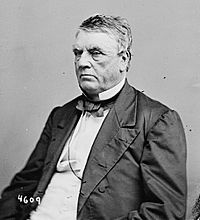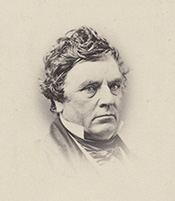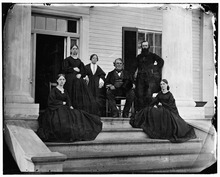John Botts facts for kids
Quick facts for kids
John Minor Botts
|
|
|---|---|
 |
|
| Member of the U.S. House of Representatives from Virginia's 6th district |
|
| In office March 4, 1847 – March 3, 1849 |
|
| Preceded by | James Seddon |
| Succeeded by | James Seddon |
| Chairman of the Committee on Military Affairs | |
| In office March 4, 1847 – March 3, 1849 |
|
| Preceded by | Hugh Haralson |
| Succeeded by | Armistead Burt |
| Member of the U.S. House of Representatives from Virginia's 11th district |
|
| In office March 4, 1839 – March 3, 1843 |
|
| Preceded by | John Robertson |
| Succeeded by | William Taylor |
| Member of the Virginia House of Delegates from Henrico County | |
| In office 1833–1838 |
|
| Preceded by | Robert A. Mayo |
| Succeeded by | Sherwin McRae |
| Personal details | |
| Born | September 16, 1802 Dumfries, Virginia |
| Died | January 8, 1869 (aged 66) Culpeper, Virginia |
| Political party | Whig |
| Other political affiliations |
Constitutional Union |
| Profession | Politician, Lawyer |
John Minor Botts (born September 16, 1802 – died January 8, 1869) was a politician, farmer, and lawyer from Virginia in the 1800s. He was a strong supporter of keeping the United States together (a Unionist) in Richmond, Virginia, during the American Civil War.
Contents
Early Life and Family
John Minor Botts was born in Dumfries, Virginia. His parents, Benjamin Gaines Botts and Jane Tyler Botts, were both well-known. Sadly, both of his parents died in the Richmond Theatre fire on December 26, 1811. After this tragedy, John and his brothers and sisters were raised by relatives in Fredericksburg. John went to school in Richmond, Virginia, and later studied to become a lawyer.
He married Mary Whiting Blair. They had several children. Three of their sons, John, Alexander, and Archibald, died young. Their daughter, Virginia, also passed away before her father. Only three of their children, Beverly, Rosalie, and Isabella, lived longer than their parents.
Career as a Lawyer and Farmer
After becoming a lawyer in Virginia in 1830, Botts moved to Henrico County, Virginia, which is near Richmond. He managed a large farm called "Half Sink" by the Chickahominy River. On his farm, he used advanced farming methods. He also had enslaved people working on his farm. Besides farming, Botts bred racehorses and worked as a lawyer.
Political Journey
John Botts first tried to get elected to political office in 1831 but did not win. However, he won the next year. He then represented Henrico County in the Virginia House of Delegates (Virginia's state legislature) from 1833 to 1839. He faced challenges in some elections but successfully proved his wins in court.
In 1838, voters chose Botts, a member of the Whig Party, to serve in the United States House of Representatives in Washington D.C. Unlike many Whigs, Botts did not support the Second Bank of the United States because he thought it went against the U.S. Constitution. However, he later supported a national bank. Botts was one of the few Southern representatives who spoke out against the "gag rule." This rule stopped anti-slavery petitions from being discussed in Congress. Botts believed it violated people's right to ask their government for help.
Botts served in Congress from 1839 to 1843. He lost his re-election in 1842 after new voting districts were created. Even though he owned enslaved people, Botts strongly opposed allowing slavery to spread into new U.S. territories. He blamed another politician, John C. Calhoun, for making tensions worse by trying to add Texas to the U.S. as a slave state. In 1842, Botts even tried to start an investigation into President John Tyler's actions, hoping to remove him from office. This effort did not succeed. After this, Botts continued to write articles and letters against adding Texas.
Botts was elected to Congress again in 1846 and served from 1847 to 1849. During this time, he led the Committee on Military Affairs. He used this position to support the U.S. Army, especially since his own son was fighting in the war at that time. Botts lost his re-election bid in 1848 but was elected again in 1850.
Botts also served as a delegate for Richmond and nearby counties at the Virginia Constitutional Convention from 1850 to 1851. Here, he led the committee on the Bill of Rights. He argued for ending the death penalty and imprisonment for debt. He also wanted more people to be able to vote and for Western Virginians to have a stronger voice in government.
In 1852, Botts went back to practicing law in Richmond. The Whig Party, which he belonged to, began to disappear. In 1854, he ran for Congress as a member of the Know Nothing Party but lost. He also opposed Kansas becoming a slave state, which was not a popular opinion in Virginia at the time.
Leading up to and During the Civil War
Botts did not like the Democratic party. He believed that Virginia's governor, Henry A. Wise, had secretly planned John Brown's 1859 raid to stir up anger among citizens. Botts tried to bring together the Know Nothing party and the new Republican party, but he failed to get enough support to run for president in 1860. During the 1860 presidential election, Botts supported John Bell and the Constitutional Union Party. Even though Bell did not win, Botts continued to support the party's ideas of keeping the country united.
Botts tried to be a delegate for the Unionists at Virginia's Secession Convention in 1861 but was not chosen. President Lincoln met separately with Botts and another Unionist, John Brown Baldwin. Both men later wrote different stories about their meetings. Neither meeting stopped Virginia from leaving the Union. Botts blamed Baldwin for not sharing Lincoln's peace offer, which he thought could have prevented Virginia from seceding.
After Virginia decided to leave the Union and join the American Civil War, Botts went back to his farm in Henrico County. He refused to fight against Virginia, but he stayed in the state and continued to write letters to newspapers, always supporting the Union.
During the war, on March 2, 1862, Confederate officials in Richmond arrested Botts and another Unionist, Franklin Stearns. They were jailed without a trial for speaking out in favor of the Union. This happened after the Confederacy stopped the right of habeas corpus, which usually protects people from being held without charges. Botts spent eight weeks alone in jail. He was released after promising not to publish any more letters that might cause trouble. In January 1863, he moved to a farm called Auburn in Culpeper County. There, Botts sometimes hosted both Union and Confederate officers. He was arrested again in October 1863 for entertaining Union officers but was released the same day.
After the War
In 1864, a small group of Virginia lawmakers in Alexandria tried to elect Botts to the U.S. Senate, but he said no. On the night President Lincoln was assassinated, some men tried to rob Botts at his home, but he managed to close the door on them.
In May 1866, Botts led a meeting of Union supporters. Later that year, he became a delegate to a convention in Philadelphia for Southern Unionists. There, he argued against allowing all men to vote. Botts suggested that enslaved people should be freed gradually, and only some African Americans should be allowed to vote. However, other politicians disagreed, and the Reconstruction Era began. Botts lost when he ran to be a delegate for Virginia's Constitutional Convention of 1867-1868. He gave his last speech to Republicans in February 1868.
Death and Legacy
John Minor Botts passed away on January 8, 1869, in Culpeper, Virginia. He was survived by one son, two daughters, and his younger brother, Charles Tyler Botts. John Minor Botts was buried in the Shockoe Hill Cemetery in Richmond. His grave marker says: "He was under all circumstances an inflexible friend of the American Union. 'I know no North, no South, no East, no West. I know only my Country, my whole Country, and nothing but my Country.'"
Elections and Conventions
Botts was elected to the U.S. House of Representatives in 1846 with 55.37% of the votes, defeating Walter D. Leake. He then lost his re-election attempts in 1848 and 1850. However, he was elected as a delegate to the Virginia Constitutional Convention of 1850. At this convention, he spoke as a reformer, pushing for more Virginians to have the right to vote.
His Book
Botts wrote a book about his experiences and the Civil War. It was called The Great Rebellion: Its Secret History, Rise, Progress, and Disastrous Failure and was published in 1866.
See also
- Virginia Constitutional Convention of 1850
 | Tommie Smith |
 | Simone Manuel |
 | Shani Davis |
 | Simone Biles |
 | Alice Coachman |




